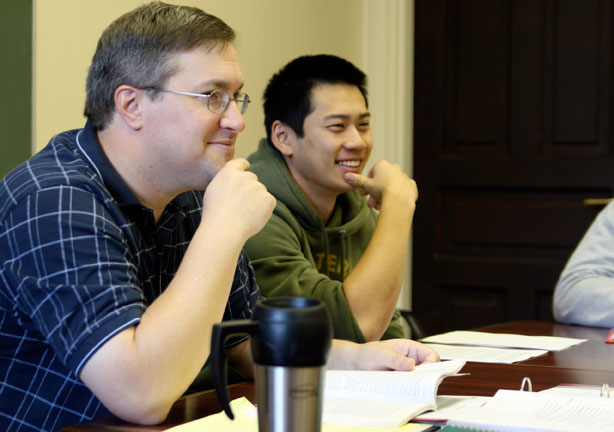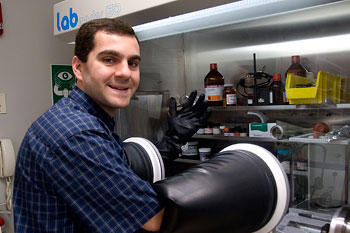 Professors Jonathan R. Baer and Lon Alan Porter, Jr. have been granted tenure effective July 1, 2009.
Professors Jonathan R. Baer and Lon Alan Porter, Jr. have been granted tenure effective July 1, 2009.
"We're Not Strangers to Each Other"
—Assistant Professor of Religion Jon Baer
WM: Your father was a professor. What’s the best advice he ever gave you about college?
Jon Baer: Look for courses you’re interested in, but the key thing is to ask upperclassmen who are the good teachers. Ask, ‘Who should I take a course with?’ A good teacher can enliven even the dullest material, but a bad teacher can ruin anything.
What happens in the classroom each day that gets you out of bed in the morning?
It all comes back to the students, to the fine young men we have here who embrace the culture, work hard, push themselves—who are eager to learn. When you have students who have those attributes, it’s a real joy to be in the classroom—you have folks who are wrestling with the materials and who are eager to grow. So it’s easy to get out of bed in the morning.
Any surprises when you first came to Wabash?
I found in coming to Wabash a really refreshing absence of the sense of entitlement I’d noticed in students when I had studied at Yale. And what that means is you can really educate folks here. You can say, "This wasn’t a good effort, this was a C paper, let me tell you why and let me help you improve in the next go round," and they receive that and work to improve. They don’t have a sense that their very presence in class means they should get an A. What makes it so exciting as a teacher is an enormous sense that you’re really contributing something to these young men and helping them to grow.
What’s your biggest challenge in the classroom?
The culture of distraction that we live in.
Even students who are willing to work, want to do well, want a good education are faced with a seemingly endless array of time-consuming distractions. From the Internet to video games, there are just a whole host of things like phones and text messages causing distraction.
All these things are supposed to simplify life and make it easier; in fact it’s having the opposite effect. I think it’s a huge challenge for educators because we’re asking students to engage in activities that are much more difficult than flipping through Web pages. It is not instantly gratifying. It doesn’t give immediate feedback. It’s an indirect investment in their intellectual growth and future career.
I think it’s a persistent challenge for us to win them over to the life of the mind, to culture that has value, that endures, and that extends beyond the moment. I think that’s important.
You’ve chaired the faculty athletics committee. How does that work contribute to Wabash?
The committee serves as a liaison between athletics and faculty. When problems arise, we can communicate so that faculty, coaches, and administrators can know we’re on the same page, working together for the betterment of these young men.
Ultimately when we convey through our actions and our words that we care for these young men and we are here for their well-being—whether in the classroom or meeting with the Board of Publications, or showing up at plays, or showing up at games—they then in turn will bring better effort to the sphere we’re involved in; I believe in this wholeheartedly. I may not be the world’s best teacher, but if they know I care for them they’re going to bring a lot more effort to the table.
Which improves all of us. It fosters that holistic education, it’s a real community in that sense when we invest in one another, when we’re not strangers to each other.
What does earning tenure mean to you?
I love the students. I believe this is a place where I can continue to give of myself to them and make some small difference in their lives, and that’s what it’s all about.
"An Intellectual Feast"
—Assistant Professor of Chemistry Lon Porter
 WM: Tell us a couple of your favorite moments—one serious, one less so—since you arrived at Wabash.
WM: Tell us a couple of your favorite moments—one serious, one less so—since you arrived at Wabash.
Lon Porter: I love working with students in the research lab, as colleagues, uncovering new knowledge together. The Celebration of Student Research is my favorite day on campus. I cannot tell you how proud I am to watch my guys share their findings with the Wabash community. This pride grows when I take them to national meetings each spring where they hold their own in the company of professors and graduate students.?
My C&T lectures and Chapel Talks have all been amazing fun, including the one where I ignited an extremely large propane balloon—and a bit of my tie. But one of my favorite moments was during a chemistry demonstration for the College Mentors for Kids group. One of the children was convinced that I was a "witch"...err warlock. Maybe too much Harry Potter for that one?
The chemistry department is known for its team-approach to teaching. What’s that been like?
Breathtaking. The opportunity to learn from the legendary teachers at Wabash has allowed me to grow and mature as an educator, while developing a style of my own in the process.
What’s the most unusual thing you did as a kid?
Did it involve fire?
Of course it did! Growing up in Texas, the kids on my block used to play "war" to an extreme, which involved a ridiculous amount of pyrotechnics.
The goofiest thing I ever did was to build a bazooka using model rocket engines and the large cardboard tubes from Christmas wrapping paper. I remember drafting it on graph paper in fifth or sixth grade and scheming to build it in secret. It worked like a champ and we ultimately duct-taped it to my bicycle.
Why did you start the Dork Club, and who is our most unlikely dork?
The Dork Club is one of my guilty pleasures! Matt McKay ’06 spearheaded the effort and I did everything I could to help. I am a huge dork (ask my wife) and gaming was a precious part of my childhood. I played cards with my grandfather; checkers with my grandmother; Risk and Monopoly with my mom and sisters. My dad worked ridiculous hours, yet still managed to play a game or two with me; that meant more than he knows.
I also love video games, but face-to-face board gaming brings people together in a more meaningful way. It helps build the types of interactions I have come to love here at Wabash. The students and I share evenings in the basement of Hays Hall playing great games that produce memories that we’ll talk about for weeks afterward.
The most unlikely dorks? Professor Steve Morillo is a favorite guest, and even Professor David Blix ’70 stopped by our last festival.
For a dork, you’re pretty competitive. What’s your most serious Wabash sports injury?
I tore my ACL during the Hays Bell Dodgeball Classic. This tradition, now in its fifth year, is an evolution of the chemisty/biology basketball game. It has grown each year and highlights the amazing opportunities I’ve had to interact with students outside the classroom. Moments like these let me know I made the right choice to be here!
You seem to revel in "dorkiness" while breaking the stereotype of the science professor.
I think students quickly come to see that I love science and l love learning even more. While I am continually amazed at how chemistry explains the nature of materials and our own biological workings, chemistry doesn’t define me as a person. Learning is contagious and the Wabash community fosters an intellectual feast to share.
One of the greatest gifts of Wabash is the opportunity to contribute to various courses, both within chemistry and beyond. My experiences in C&T, senior colloquium, freshman tutorial, and the electron microscopy course I teach for biology are exciting experiences that allow me to teach while learning. The relationships I build with students and colleagues mean more than I can put into words.
What does earning tenure mean to you?
It is a great honor. I view it as the culmination of a personal and professional commitment to the Wabash community. People are foolish if they imagine tenure as a resting state; it comes with increased responsibility and dedication. The faculty serve as the stewards of the rich Wabash tradition of academic rigor and excellence. It’s also extremely intimidating to attempt to live up to the legendary examples of those who came before us and the amazing colleagues I am privileged to work with.